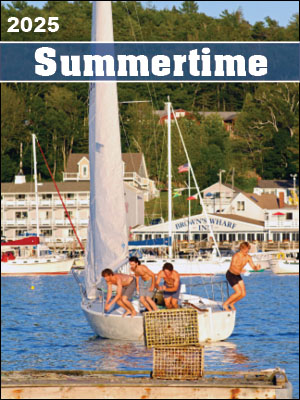JEDC, partners present economic master plan
The Joint Economic Development Committee hosted business leaders and community members throughout the Boothbay region for the final economic development and strategy action plan on Thursday, Feb. 1. The final assessment follows the Thursday, Oct. 12 workshop which found business and community leaders throughout the peninsula working together to draft ideas to bolster the local economy in the short and long term.
The JEDC partners from Camoin Associates, MRLD Landscape Architecture and Urbanism, and Wright-Pierce – Jim Damicis, Mitchell Rasor, and Travis Pryor, respectively – presented the findings and their professional interpretations of them.
Six goal areas – business growth and development, housing, downtown and waterfront, tourism, transportation, and collaboration – were the subjects of the assessment consisting of several objectives and actions to be taken, leads and partners, time frame, measures for success and resources. Damicis called it an action plan matrix.
One of the objectives under Business Growth and Development (Goal Area 1) is to actively promote that the Boothbay region is “open for business.” Actions for it include working with marine-based businesses to address workforce, reaching out to local real estate brokers, connecting young people to vocations through school programs, and identifying public funds matching private funds for training in businesses that distinguish the region from others. The objective identifies leads and partners as possibly being the Department of Marine Resources, Bigelow Labs, town planning boards and select boards, school boards, school principals, and other local aquaculture businesses.
For Goal Area 2, housing, Damicis said the team found that land values compared to other similar communities are relatively high.
“That creates a problem in terms of availability of affordable housing,” said Damicis. “The problem is that it constrains the workforce – that could be seasonal in terms of it being hard to find people places to live during the tourist season, but it can be year round as well.”
Damicis drew on a recent housing study in Kennebunkport with similar housing problems which, there, created a shortage of emergency volunteer personnel. He said this began eroding at the core community values. Damicis gave examples of private companies or landowners donating land, Habitat for Humanity which is building a whole community for the first time in Scarborough, and Mount Desert Island, which has been raising private funds from seasonal people willing to support affordable housing.
For Goal Area 3, Downtown Development and Waterfront Management, Damicis said developing a master land use plan for the waterfront would also be well-advised. It would combine land use engineering, regulations, what can go in the waterfront area, and what it would look like.
“… The economy has changed and maybe you have some values that have changed or you may have some that stayed the same, but it’s important to update those regulations and it’s very, very important that they be clear – clear to the residences and clear to future investors and developers as well.”
Goal Areas 4, 5 and 6 – Tourism Infrastructure Maintenance, Regional Transportation and Planning, and Regional Collaboration, respectively – involve identifying and reinforcing existing assets, considering the current and future technologies as long term options, and standardizing planning processes across all four towns of the region.
“Developers and businesses don’t necessarily look at a town first, they look at a region and the better that you can have similar standards across the towns, the more that you’re going to be conducive to investment,” said Damicis. “You want some consistency in those codes and standards in those kinds of things.”
When it came to sharing opinions on the findings, business leaders and community members were receptive, but skeptical that without hiring a staff planner and economic developer, community leaders would not find the time or resources to see the plans through.
“I really think … somebody has to have the responsibility to execute this stuff … It’s not going to be those of us who already run businesses or organizations,” said Margaret Hoffman, executive director of Boothbay Railway Village.
Scott Larson, owner of Newagen Seaside Inn and Linekin Bay Resort, said he believes the environment has to be one where a regional planner would succeed.
“There’s no point on really starting any of this unless the environment will allow it to happen,” said Larson. “… The towns do have to work together, codes have to get redone, there has to be a willingness to accept new ideas, new thoughts because somebody’s going to hang themselves from the nearest tree if … all they have is road blocks every time they try to do anything. To me, that’s where we start.”
Damicis suggested for the region a full-time staff member with planning and economic development experience and knowledge, and having the person begin by concentrating on key goals and actions which have not yet been initiated.
“One thing is very clear, is if we want economic development on this peninsula, we’re competing with almost every other town in Maine.” said Wendy Wolf, JEDC co-chair.
Wolf said communities like Freeport and Rockland have overcome much larger obstacles and the only way to succeed in keeping the Boothbay region a prime attraction is to bring more business in and to expand existing businesses. Wolf said what makes some of these communities successful is having businesses and residents who actively pursue making their town or city a place other people want to invest in.
“It’s not just a group of 15 people appointed by two towns carrying the ball,” said Wolf. “If you guys want us to be a vibrant community, we need everybody to work on this with us.”
The town managers can only do so much in addition to the customary expectations, said Wolf, stating she also believes it is a good time to start considering a staff person dedicated to the region’s economic development and planning strategies. Because the towns are approaching the end of budget season, Wolf said the towns would likely not be able to hire another full-time person until 2019.
Said Wolf, “What this means is if you think this is important (we) need to start talking to our selectmen and budget committee members … If we want to grow, we have to invest in ourselves."
Event Date
Address
United States


































